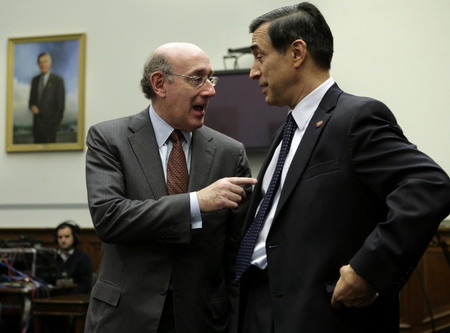Global Biz
Watchdog: US bailouts created more risk in system
(Agencies)
Updated: 2010-01-31 15:34
 |
Large Medium Small |
|
 Kenneth Feinberg (L), special master for executive compensation under the Troubled Asset Relief Program at the Treasury Department, talks to Rep. Darrell Issa (R-CA) before the House Oversight and Government Reform committee holds a hearing on "Executive Compensation: How Much is Too Much?" on Capitol Hill in Washington October 28, 2009. [Agencies] |
Barofsky's report echoed concerns raised by housing experts in recent months, as home sales and prices rebounded. They warn that the primary reason for the turnaround last year has been billions of dollars in federal spending to lower mortgage rates and prop up demand.
"The lion's share of the remaining decline will occur in markets that saw sizable bubbles but have not yet retrenched," he wrote.
Officials from the Obama administration counter that massive federal intervention has helped the housing market stabilize and prevented more dire consequences.
Barofsky's report also disclosed that, while the Obama administration has pledged to spend $75 billion to prevent foreclosures, only a tiny fraction, just over $15 million, has been spent so far. Under the Making Home Affordable program, only about 66,500 borrowers, or 7 percent of those who signed up, had completed the process as of December.
He said the key to preventing future crises is to reform Fannie Mae and Freddie Mac, create and improve loan underwriting and supervision of banks. He stopped short of endorsing specific proposals for overhauling financial regulation, but said many of the proposals would go far to improving the system.











